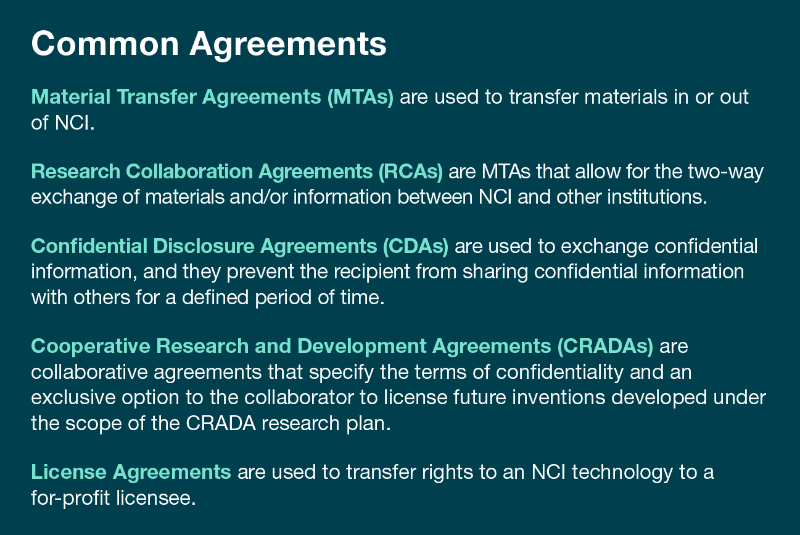NCI and Frederick National Laboratory investigators make important scientific discoveries every day. Sometimes those discoveries lead to an invention. While competitive science can make it tempting to report the findings right away, that might not be the best idea.
Instead, it’s time to talk with a technology transfer manager (TTM). These employees, stationed in the NCI Technology Transfer Center (TTC), are go-to resources for help with inventions and partnerships. The TTMs play a fundamental role in protecting the interests of NCI and the investigators. In addition to managing NCI’s inventions, TTMs negotiate a range of agreements so that materials and data can be shared under applicable laws and policies.
The TTC manages the technology transfer activities at NCI and nine other National Institutes of Health institutes and centers. It also works closely with the Intellectual Property and Strategic Agreements Office and Partnership Development Office at Frederick National Laboratory, the groups that coordinate technology transfer activities for the national laboratory contractor employees.
The TTMs at TTC are guardians and guides: experts in business, law, and science who help investigators navigate invention and technology transfer practices. They work to establish successful partnerships and to safeguard the fruits of research so that the investigators can receive proper credit for their inventions before the work is publicly disclosed.
Naturally, that means wearing many hats. TTMs negotiate agreements with other institutions, meet with investigators to discuss technologies and projects, evaluate technologies for patentability and develop plans for further commercialization, and provide educational and training resources related to technology transfer. They help forge collaborations between organizations and NCI and Frederick National Laboratory investigators.
TTMs also act as a bridge between patent law firms and investigators during each stage of the patent filing process. They negotiate license agreements with commercial parties for investigators’ patented or non-patented technologies, creating potential royalty revenue for investigators and NCI as a whole.
Working with a TTM
When an investigator makes a request for technology transfer, such as releasing a process or material to another organization, a TTM will collaborate with the investigator to determine which of the TTC’s many types of strategic agreements is best for the situation.
The process for patenting an invention involves a similarly close relationship. For the smoothest outcome, investigators should contact their TTM at least three months before disclosing the invention in any public setting, including casual conversations with people outside the National Institutes of Health.
Reporting an invention involves submitting an Employee Invention Report (EIR) that asks for a description of potential invention, any prior disclosures, and the list of inventors and their relevant contributions. After the EIR is submitted, the TTMs will help determine whether the technology is sufficiently novel, non-obvious, and useful to qualify as an invention. If it does, they will help the investigator navigate the patent application process with lawyers and other involved groups.
Investigators, meanwhile, should focus on giving timely responses to requests to ensure they meet the U.S. Patent and Trademark Office deadlines.
Even if the technology doesn’t require patent protection and is deemed a research tool, it can still be licensed and produce royalties. TTMs are able to help with that, too.
Thanks to support from a TTM, NCI investigators can set up agreements that document their collaborations to ensure that their rights and responsibilities are clearly defined and protected. This is an important step for disseminating and further developing NCI technologies, which ultimately benefits public health.
If You’re Not Sure, Ask
If you have any questions related to technology transfer or the special programs and resources the TTC has to offer, feel free to contact your TTM directly or reach out to NCITTCFrederick@mail.nih.gov.
More information is available on the TTC website. You can also connect with the center via Twitter and join its LinkedIn group.

Michelle Favila is a TTM at NCI TTC’s Frederick Unit. Jeff Thomas is the TTC Frederick Unit supervisor. The TTC’s mission is to “enable and guide collaboration, invention development, and licensing to advance today's discoveries into tomorrow's medical care.”


